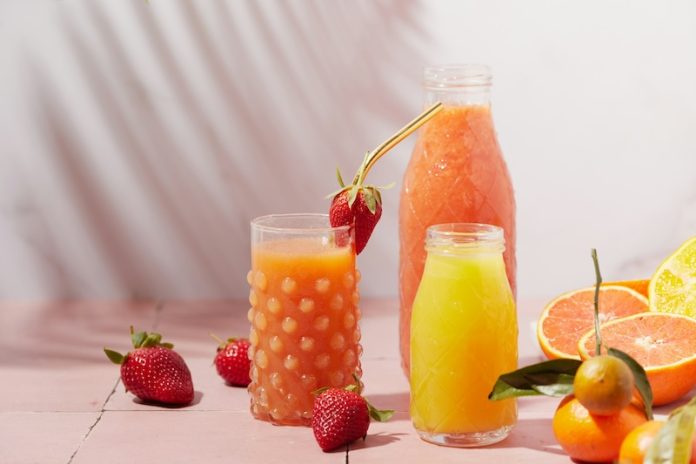
Many people turn to juice cleanses in the belief that they improve health, detoxify the body, and promote weight loss. However, a new study from Northwestern University suggests that an all-juice diet might do more harm than good.
Researchers found that consuming only vegetable and fruit juices—even for just three days—can lead to changes in gut and oral bacteria associated with inflammation and cognitive decline.
The study, recently published in Nutrients, compared the effects of different diets on the microbiome, the community of bacteria living in our gut and mouth. The results challenge the idea that juicing is a purely beneficial health trend and highlight the importance of fiber in maintaining a balanced microbiome.
The Study: Juicing vs. Whole Foods
Northwestern scientists studied three groups of healthy adults who followed different dietary plans:
- Juice-only diet (no solid food)
- Juice combined with whole foods
- Whole, plant-based foods only
To measure the effects of these diets, researchers collected saliva, cheek swabs, and stool samples before, during, and after the diet period. Using advanced gene-sequencing techniques, they analyzed bacterial changes in participants’ mouths and guts.
Key Findings: Juicing May Disrupt the Microbiome
The results were clear: the juice-only group experienced the most significant negative changes in bacterial populations.
- Increased inflammation-related bacteria: The gut microbiome of juice-only participants showed a rise in bacteria linked to inflammation and gut permeability.
- Less favorable bacterial shifts: The plant-based whole food group had more positive changes in microbiome diversity.
- Juice plus food group showed mixed results: This group experienced bacterial shifts but not as severe as the juice-only group.
The findings suggest that removing fiber from fruits and vegetables by juicing could have long-term health consequences by disrupting the balance of good and bad bacteria in the gut.
Why Fiber Matters
Fiber is crucial for gut health because it feeds beneficial bacteria, helping them produce anti-inflammatory compounds like butyrate. But juicing removes most of the fiber from fruits and vegetables, leaving behind a high concentration of natural sugars.
- Without fiber, sugar-loving bacteria thrive, which can lead to gut imbalances.
- High sugar content in juice fuels harmful bacteria, increasing inflammation.
- Lower fiber intake may affect metabolism, immunity, and even mental health.
According to senior author Dr. Melinda Ring, director of the Osher Center for Integrative Health at Northwestern University, these findings challenge common beliefs about juicing.
“Most people think of juicing as a healthy cleanse, but this study offers a reality check,” Ring said. “Juicing without fiber may lead to microbiome imbalances that could have negative consequences, such as inflammation and reduced gut health.”
Oral Microbiome Changes Happen Fast
While the gut microbiome remained relatively stable, the oral microbiome changed rapidly during the juice-only diet.
- Beneficial bacteria (Firmicutes) decreased
- Inflammation-associated bacteria (Proteobacteria) increased
This suggests that the mouth reacts more quickly to dietary changes than the gut, making it a useful early indicator of how diet affects health.
“The oral microbiome appears to be a rapid barometer of dietary impact,” Ring noted.
Rethinking Juice Cleanses
The study raises concerns about the long-term effects of juicing, especially for children, who often drink juice as a substitute for whole fruit.
First author Maria Luisa Savo Sardaro emphasized the need for more research into how juice diets shape the microbiome. She stressed that the sugar and carbohydrate content of juice plays a crucial role in microbial changesand should be carefully considered when designing dietary recommendations.
For now, Dr. Ring advises juice lovers to opt for blending instead of juicing to keep fiber intact or pair juices with whole foods to reduce the potential negative impact on gut and oral health.
Takeaway: Juicing Isn’t Always Healthy
While juices can provide vitamins and antioxidants, a juice-only diet may disrupt gut and oral bacteria, leading to inflammation and potential long-term health risks.
Maintaining fiber in the diet is essential for microbiome balance, immune function, and overall well-being. Instead of relying on juice cleanses, a diet rich in whole, plant-based foodsmay offer better and more sustainable health benefits.
If you care about nutrition, please read studies about how Mediterranean diet could protect your brain health, and this plant nutrient could help reduce high blood pressure.
For more information about nutrition, please see recent studies that olive oil may help you live longer, and vitamin D could help lower the risk of autoimmune diseases.
The research findings can be found in Nutrients.
Copyright © 2025 Knowridge Science Report. All rights reserved.



